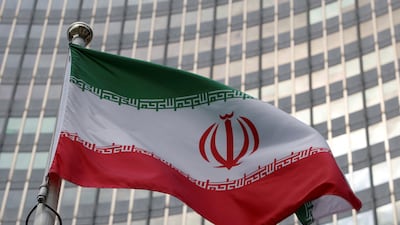Iranian MP Mahmoud Nabavian on Monday called for Tehran to change its nuclear policy to allow it to develop "any weapon that creates deterrence" against attacks on the country.
His comments follow a series of similar remarks from senior officials, who said Iran should abandon its long-standing position against developing nuclear weapons, after coming under direct attack from Israel twice this year.
Speaking at an open session of parliament, Mr Nabavian said national security was a "red line" and that adapting Iran’s nuclear policy had become a “clear necessity”, state news agency Irna reported.
“The Iranian nation will utilise any weapon that creates deterrence against its enemies,” he was quoted as saying. “The Iranian nation must be equipped with all the weapons that its terrorist enemies, America and Israel, possess.”
Iran and Israel exchanged direct attacks direct in April and October amid rising regional tension caused by the war in Gaza. Iran launched barrages of missiles, drones and rockets at Israel that were largely intercepted by air defence systems, with help from allies including the US. Israel's attacks are believed to have damaged Iran's air defence systems and weapons production sites, after Washington put pressure on Israel to avoid striking nuclear and oil production sites.

Iran has long insisted that its nuclear programme is for peaceful purposes, with a fatwa issued by supreme leader Ayatollah Ali Khamenei banning the development of nuclear weapons. But the country is believed to be close to enriching uranium to weapons-grade levels, after the collapse if a nuclear deal with world powers in 2018. The 2015 agreement, known as Joint Comprehensive Plan of Action (JCPOA), placed curbs on Iran's nuclear activities in exchange for the lifting of sanctions on Tehran.
The head of Iran's Strategic Council on Foreign Relations, which advises Mr Khamenei, said in May that Iran had not made a decision to produce an atomic bomb, but would have to "change its nuclear doctrine" if it came under an existential threat, particularly if its nuclear sites were attacked. Months earlier, Intelligence Minister Mahmoud Alavi said a "cornered cat" behaved differently than when it was free.
"If they [western states] push Iran in that direction, then it's no longer Iran's fault," he told state TV. In April, Brig Gen Ahmad Haq Talab, a commander at the nuclear centres protection and security unit of Iran's Islamic Revolutionary Guard Corps, said the country's policies could be revised if its nuclear sites were attacked.
In an analysis published this month, Hamidreza Azizi, non-resident fellow at the Middle East Council on Global Affairs, said such a change in discourse could mean that Iran planned to develop a nuclear weapon, or wanted to raise the stakes in future negotiations.
But the re-election of Donald Trump, who pulled the US out of the nuclear deal during his first term as president, is also a factor, Mr Azizi said. "Trump's return to the White House, with his history of 'maximum pressure' on Iran and unwavering support for Israel, could heighten tensions and serve as a catalyst for Iran's push towards nuclear weapons," he added.


